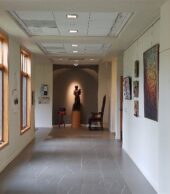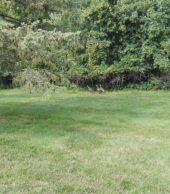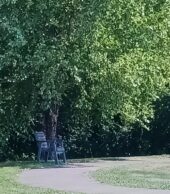Full of Days: On Retirement and Deserts
I’ve always liked my feet. I thought they were quite pretty, at least as feet go. But a few months ago, after a long hike in the mountainous desert, I took off my shoes and socks and someone else’s feet emerged. Far from pretty, they looked like a topographical map of the terrain I had just crossed: rocky outcroppings and dry gullies, traversed by rivers of bulging veins. I wanted to turn away, but instead I looked at my feet for several minutes. If I had been wondering where the years went, the answer was right in front of me!
In times of transition I come to the desert. It is a mysterious no-place that mirrors the experience of life between jobs, relationships, or life stages. Having wandered for some time now in that strange territory somewhere past middle age but not yet elderly, I was holding a question: How may I come into old age ‘full of days,’ rather than simply having filled my days? ‘Full of days’ is the Biblical description given to those who reach the end of life fulfilled and ripe with wisdom. My own life seemed to be quickly accelerating toward nowhere. It was time for me to pause and take stock.
A Place of Spiritual Transformation
The desert, in my faith tradition, is also a place of spiritual transformation. Like Christian contemplatives before me, I am drawn to the emptiness of the land and its invitation to listen more deeply to God. And while a ‘desert’ can be anywhere that we pause and open to the mystery of the present moment, there is something in the starkness of the desert landscape itself that makes it seem, as Belden Lane observes in The Solace of Fierce Landscapes, “indifferent” and “inattentive to human anxiety.” As such, it can bestow a strange kind of grace even as it leads to a personal reckoning.
Now, each day as I walk the dry and thorny land, I am coaxed further toward my self’s boundary. Anxious thoughts recede, while signs of life come forward unbidden: the sharp smell of the creosote bushes, the chattering of a morning bird. A lizard scurries across my path without regard, and the occasional yellow of a cactus flower leaps brilliantly against its austere background. Time unfurls herself before me and I walk.
The Complexity of Retirement
I had looked forward to my post-employment years as a time to live more in tune with my solitary nature. For so long, I had chafed against the pace that the world demanded, and others did not seem to understand my insatiable need for aloneness. Balance eluded me and irritation simmered constantly just beneath the surface.
When a spiritual director introduced me to contemplative prayer, which is a practice of releasing thoughts to rest silently in the presence of God, it felt like a homecoming. I began to practice regularly, first once and then twice daily, and gradually the tension between my inner and outer worlds eased. Still, I longed for undivided time. In contrast to the many self-help books about this stage of life as a smorgasbord of new endeavors, I smugly envisioned my own retirement as just what it sounded like: a retreat from a frenzied world.
But I was not prepared for the void left by the lost roles and rhythms of work and parenting. A friend of mine calls retirement a time-space warp, and with good reason. The disorientation that ensued was profound and terrifying. Anxious questions clamored for attention: Have I accomplished anything of lasting value? Who am I now? Like the Israelites who demanded that Moses return them to Egypt and the familiarity of slavery rather than endure danger and privation in the wilderness, I was soon trying to ward off discomfort by creating a whole new array of busy activities. Prayer itself became an unyielding desert.
Being Lost. Being Found by God
Perhaps I should have known it could not be so easy. The Christian contemplative path has always been a narrow one of self-surrender, and being lost is the beginning of being found by God. Silent prayer, originating with the monks of the early centuries CE, is in fact a moment-to-moment practice of surrender which becomes a way of life, but not before, as James Finley observes, “unraveling our ability to live life on our own terms.” Even a life of prayer, if pursued on our terms, can lead us away from God.
The only way forward was deeper into silence. And so, still believing that I was the seeker rather than the one who was sought, I returned to the desert. As I sat in quiet prayer and walked each day, I began to see myself more clearly, for without the constant mental chatter there was nowhere to hide. The unrelenting land and the sun’s glare sheared away falseness; insights came, piece by piece, but they offered no comfort. From behind my need for solitude there emerged a strong sense of self-importance and behind that, a fearful child. Solitude, although a true part of my nature, had become a proud coat-of-arms, an idol, and an excuse to keep a self-protective distance from others.
I sadly recalled how many times I had avoided people or turned down heartfelt invitations. Once, I abruptly ended a relationship that was growing too close. How much of life’s messy, living texture of giving and receiving I had missed! I had stood apart, aloof and airy, and what I thought was the barren desert of retirement was my own parched and desolate inner landscape.
Silence is Presence, not Absence
But in that same searing moment of self-knowledge, in the very heart of my wretchedness, God was waiting to embrace me, touching the past and blessing the future. This is the mystery of the desert: that silence is not absence but Presence, and a cup of emptiness can be healing water.
When we set out into the desert, we leave behind the familiar signposts, not knowing where we will be led. The great surprise for me has been that the more I sit alone in inward silence, the more I am drawn back outward. What I had longed for was to be not alone but to be at ease with myself in the world. Now, as I slowly learn to set myself aside, people blossom before me. I delight in a friend’s unique turn of phrase and marvel at another’s endless knowledge of birds and plants as we walk together. I dance with my grandchildren and our laughter hangs in the air. My days, some busy and some not, are full in a way that has little to do with time or activity, and as I give myself over to this, there are wonders all around me.
Gazing at my feet again, a feeling of fondness begins to replace my initial shock at the changes that have taken place. These loyal appendages have served me well for more than six decades, and it shows. But I think they have more than a few good desert hikes left in them, as they must, for we are always called beyond where we are, into ever more fullness of life with God. Slowly, I return socks and shoes to my feet and head out the door.

This essay was originally published on Bearings Online on June 4, 2020 at https://collegevilleinstitute.org/bearings/full-of-days/
Jody Reis Johnson will lead an online series, Together in Contemplation, on Tuesday evenings this fall. More information and registration for the Together in Contemplation series






